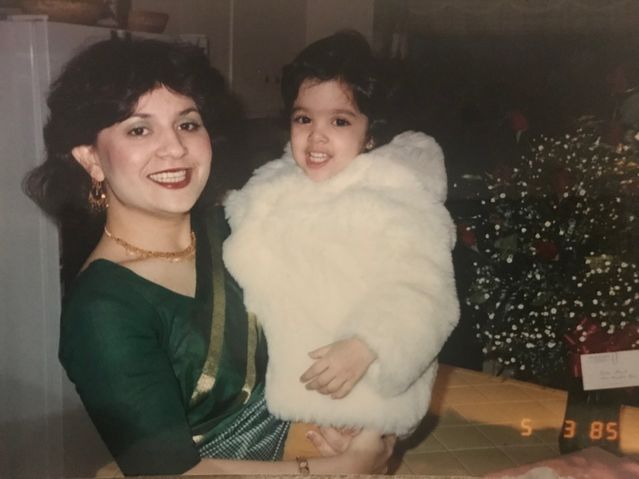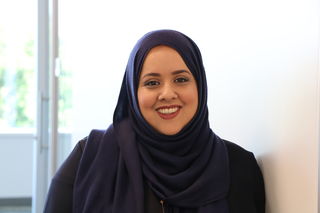Health
How Muslim Americans Are Fighting Mental Health Stigma
Psychiatry and communities of faith don’t have to be mutually exclusive.
Posted April 18, 2019
By Laura Lee Huttenbach
Growing up, Naureen Ahmed never felt comfortable inviting her friends from school over to play. Some days, her mother, Seema, would be happy—dressed in an elegant sari, wearing bright red lipstick, painting or sculpting or dancing or singing. On other days, Seema paced the house, ranting. She flicked the lights on and off. She sometimes became aggressive, on occasion slapping, hitting, or choking her children.
As a child, Naureen didn’t understand her mother’s erratic behavior. Her grandparents, who lived with the family, told Naureen that Seema was just “depressed” with a “chemical imbalance.” That was as far as their explanation went, even though her grandparents knew Seema’s actual psychiatric diagnosis was bipolar disorder with schizoaffective disorder. But Naureen wouldn’t find that out until she was 25. “If we had had that knowledge before, we would’ve been empowered to understand what she was going through,” Naureen, now 36, says, speaking on the phone from her home in Chicago.

Her grandparents prohibited Naureen and her sisters from talking about their mother to anyone outside the family. “It was our big secret,” Naureen says. Even Seema, in her lucid states, begged Naureen, “Please don’t tell people I’m crazy.” It became clear to Naureen that whatever plagued her mother was considered something to be ashamed of.
Stigma around mental illness is a problem throughout American society, but Naureen experienced a particular kind of stigma growing up Muslim in a small Arkansas town, the child of Pakistani immigrants, attending a Lutheran school. When Seema died in 2012, Naureen searched for a way to grieve. In her pain, she wanted to find purpose. After years of healing and therapy, in 2018, she founded an organization to create communities of support for people whose loved ones struggle with mental illness. She named the organization Support Embrace Empower Mental Health Advocacy, or SEEMA.
As people in the Muslim American community continue to face distinct challenges related to mental illness and stigma, advocates and mental health professionals are working to come up with solutions. “We felt so isolated in Arkansas,” Naureen says. “I want to give families and kids affected by mental illness the sense that they are not alone.”
***
When Farha Abbasi was in her second year of psychiatric residency at Michigan State University about 15 years ago, she set up a booth at a health fair hosted by a local Islamic Center. She put up a big sign advertising free mental health screenings. The booths around her were crowded with people checking their blood pressure or picking up educational materials. “But not even one person wanted to talk to me,” she says, laughing. Someone she recognized from the mosque felt bad that she was sitting alone and finally joined her for a few minutes. But when Abbasi began the mental health screening—asking, “Do you feel sad or depressed sometimes?”—the woman excused herself and left.
From this experience and her work since, Abbasi, who is a psychiatrist and professor at Michigan State University, has learned how mental illness can be viewed in the Muslim community and other faith communities: “If it’s a physical condition, it’s okay to access help and talk about it,” she says. “But when it comes to mental struggles, people want to keep it quiet and secretive.” One reason for this, she says, is that community members often see mental illness as a mark of weakness—in their faith in God, in their character, or in their mind. “People will say, ‘You’re not praying enough. Be thankful,’” Abbasi says. “Or, ‘Oh, you’re whining. Toughen up.’” Supernatural beliefs may also contribute to misunderstanding about mental illness in some spiritual communities, according to Abbasi. Might the person be possessed by devils, spirits, or jinn—a supernatural creature? Did somebody cast an evil eye on him?
Naureen recalls that her mother, during psychotic fits, would cry and moan in ways that made her sound like she was possessed. “The sounds coming out of her were so scary,” Naureen says. When she was in eighth grade, she says, her grandparents took Seema to India to see if she was possessed by a jinn. Naureen doesn’t know much about what happened, but nothing seemed different when they returned home.
To counter beliefs that might impede treatment, Abbasi says, the first steps are to raise awareness through education and normalize the idea of mental illness in the Muslim community: “It happens in one in four people, so there’s no way praying or being in certain family situations is going to protect you.”
Once, she recalls, she was working with a family to locate a child who was having psychotic breakdowns. “We find out that even during his psychosis, he still manages to go for Friday prayer,” she says. “I was like, ‘Oh, this is perfect. We should go there and get him admitted.’ And the first reaction from this family was, ‘Anywhere but at the Islamic Center. We don’t want the community to know.’” Abbasi wants to flip this fear. She sees Islamic centers as a potential resource for those grappling with mental health issues. Envisioning an arena that would bring religious leaders and mental health professionals to the same table, she used a minority grant from the American Psychiatric Association to found the Muslim Mental Health Conference.
A few weeks ago, at the 11th Annual Conference in Tempe, Arizona, panel discussions focused on topics such as depression and the roles of faith leaders as advocates for mental health, as well as on Islamophobia, domestic violence, and LGBTQ rights. Imams—Muslim spiritual leaders—sat next to psychiatrists. Naureen was there, too. “SEEMA is a good example of how so many families are suffering in silence,” Abbasi observes. “Now that we have a platform, all these different organizations and individuals are coming together. This is a mental health family.”
Another barrier to accessing mental health care is a fear that providers won’t accept spirituality as part of one’s core understanding of the world. And people who think they won’t be understood may think twice before opening up. Removing this barrier requires the participation of not just the individual, but mental health professionals. “How you understand the sensibility and sensitivity of a culture can make or break your rapport with a patient,” Abbasi notes.
A therapist’s own understanding—or misunderstanding—of a Muslim patient’s culture might influence whether the best treatment is provided. For example, when a patient is entering psychosis, a common initial delusion often wears religious garb. “You either feel you are God or like God is giving you commands,” says Abbasi. “You could be an atheist and still get religious delusions.” It’s necessary for a provider to understand the difference between what comes from religion and what comes from delusion. “That’s where the cultural competency is important.”
The study of medicine, however, hasn’t always left room for spirituality or a belief in a higher healing power. When Rania Awaad began her psychiatric residency at Stanford University 10 years ago, she recalls that one message of her training was, “If you can’t empirically prove something, then don’t bring it into the space.” One of Awaad’s courses during the residency was on culture and mental health, but the class disappointed her because she felt it didn’t adequately address the issue of faith.
For patients who have a God-centered worldview, “when you go into what feels like a very secular space, and you can’t really speak about God, it feels very stifling,” she says. “People almost never come back to therapy.”
Mental health professionals are trained to ask their patients private questions, but in Awaad’s training experience, the questions were more likely to focus on a patient’s sexual orientation or financial situation than spirituality. She believes that a therapist who ignores this part of a patient isn’t providing holistic care. Awaad spoke to her training director at Stanford about this blindspot, and her academic advisors listened. “As soon as I graduated, they were like, ‘Okay, since you complained about the class, how about you teach it?” Today, she and a colleague who comes from a Christian background teach residents a course called “Culture and Religion in Psychiatry.”
Awaad recognizes that aspects of a person’s faith could be a part of the problem, but she also wants mental health providers to acknowledge that religion or the religious community could be part of the solution. Faith, she says, can be extremely useful to a person when it comes to “coping, resilience, and finding the strength to move forward, but it’s not necessarily preventive.”
Like Abbasi, Awaad won a minority grant from the American Psychiatric Association, which she used to found the Stanford Muslims and Mental Health Lab, where she currently serves as director. She is also Clinical Director at the Bay Area branch of the Khalil Center, where the therapists are licensed professionals who also have a background in Islamic theology. In a session, this means a therapist may draw from a story or lesson in the scripture in order to illustrate fortitude, hope, or self-confidence. “You’re more likely to gain traction in therapy if you can use something they already connect with,” Awaad says.
She is heartened by the progress in the last decade toward creating a mental health system that is welcoming to people of different faith backgrounds.“When I was in training, there was no way I could’ve even imagined all this would happen,” she says. “This is like pie-in-the-sky type of thinking.”
She also works hard to make sure that faith leaders become advocates of mental health. Recently, she organized a mental health training session with imams from the Bay Area. At the beginning of the eight-hour course, Awaad noticed that one imam seemed completely disengaged. “He had his laptop open, typing away, not paying attention,” she recalls. He was a leader in the community, so Awaad was disappointed. But as the day progressed, the imam started paying more attention until finally he closed his laptop.
At the end of the course, the imam came up to speak with Awaad. She recalls that he told her: “I did everything in my power to try not to show up to this thing. I figured I’ve been an imam for so long, I know everything. There’s nothing you could possibly teach me that I don’t know.” But the session delivered an epiphany: “I now realize how much I didn’t know. There were all kinds of cases that probably came to me, and I didn’t realize they were about mental health, and I should’ve referred them to mental health professionals.” He urged his colleagues to attend the next sessions.
In January, Awaad facilitated an interfaith session, called the Pastor’s Symposium. She hopes her work can serve as a model for other religious groups: “The scripture may be different, but the essence of the struggle is the same.”
***

As much as Naureen craved connections with people who had experience loving someone with a mental illness, it took her a long time before she was able to speak about her mother. In August 2017, she read a personal story on the site Narratively by journalist Shaheen Pasha titled, “For Decades, Shame Kept My Dad’s Schizophrenia Secret From Our Pakistani Immigrant Community.” As Naureen read Pasha’s words, she started crying. “I thought I was the only person in the world who went through something like this,” she says. She began corresponding with Pasha and, a few months later, launched SEEMA.
In March 2018, Naureen attended the Muslim Mental Health Conference in Washington, D.C. One of the weekend events was called “Narratives of Pain,” an open mic at which people could share their personal experiences with issues related to mental health. For the first time, Naureen told her story. “I was so scared I was shaking,” she says. When she finished, she received a standing ovation.

Every time Naureen speaks or writes about her experience, she hears from people going through similar struggles who are relieved not to be alone in their pain. “Everyone is going through something,” Naureen says. “No family is perfect.” She hopes that her example will encourage others to be more open about their challenges. Many Muslims, she says, “try to portray themselves as all living ideal lives—practicing our faith, that our kids are doing well in school, and they’re God-fearing. No one’s drinking or doing drugs. We need to stop trying to portray ourselves as perfect and be willing to be vulnerable and say, 'You know what, I’m going through something, too. Maybe we can support each other.'”
A year ago, Saima Ahmed, a kindergarten teacher and a mother of three living in the suburbs of Chicago, attended her first SEEMA meeting. Her father has been struggling with severe depression for the last 18 years, she says, and other relatives have been diagnosed with anxiety and schizophrenia. Before learning about SEEMA, she said it was difficult to find a space where she felt comfortable talking about the personal impact of her father’s mental illness.
In her experience in Indian and Muslim communities, she says, mental illness has often been ignored or swept under the rug. “If someone asks about your day, you’re like, ‘Oh, I got stuck in traffic, and I have a headache.’ You wouldn’t say, ‘Oh, my anxiety is awful today. I couldn’t get out of bed.’” Often, when she did confide in people about her father’s depression, she found she was hushed: “Don’t say that about your father.” Or, “Just pray it off.” Or, “Say this prayer instead of that prayer.”
At the SEEMA meeting, she walked into a room full of other people whose lives, in some capacity, included mental illness. Naureen opened the meeting. “She’s like an open book with her story,” Saima says. “She put everybody’s heart at ease.” A therapist moderated the discussion, and people were invited to participate. “I met people who had the same worries,” says Saima. “I’m a grown woman, and I can’t help my Dad. It’s such an awful feeling. Sometimes, you just wake up feeling hopeless.” When she walked out of the meeting, she says, “I didn’t feel like I was alone anymore. I belonged somewhere. I left with more hope.”
Laura Lee Huttenbach is an Editorial Intern at Psychology Today. She is also the author of "The Boy is Gone: Conversations with a Mau Mau General" and "Running with Raven: The Amazing Story of One Man, His Passion, and the Community He Inspired."
LinkedIn Image Credit: Atstock Productions/Shutterstock




